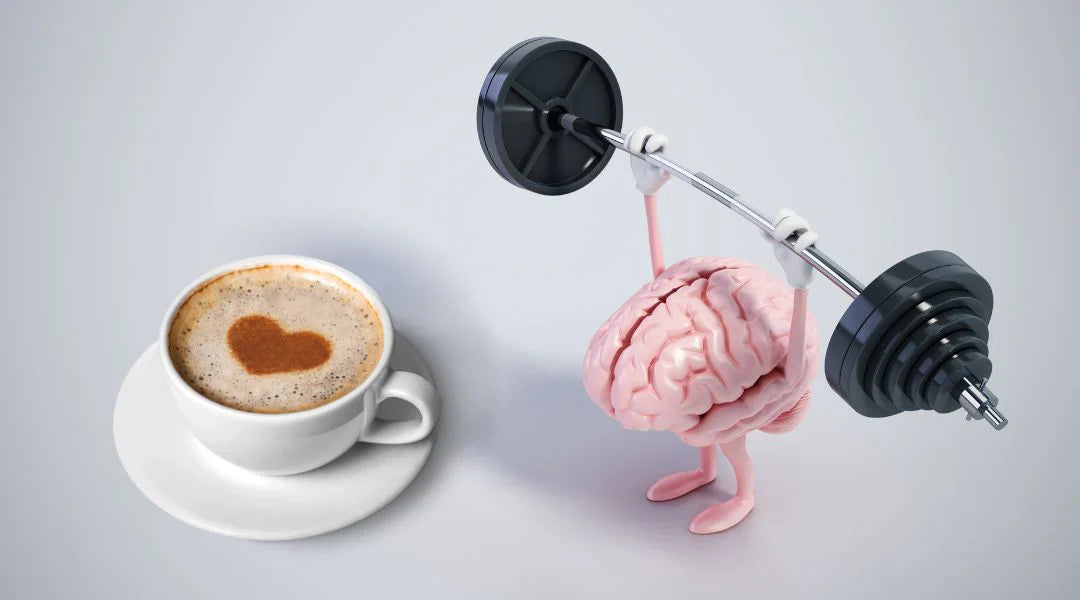
Brewing Brain Health - The Benefits Of Coffee On Cognition
For avid coffee enthusiasts, here's a double shot of good news--your favorite beverage not only gives you a pick-me-up but also serves as medicine for your brain. Recent research is unveiling the remarkable ways in which coffee can enhance memory, attention, and mood, and act as a shield against the onset of Alzheimer's, depression, and cognitive decline.
Let's dive into the research to uncover the benefits of coffee on your brain health and discover why this happens.
The Brain Health Benefits of Coffee
Coffee, Cognitive Decline, and Alzheimer's
Researchers wanted to understand how drinking coffee might influence cognitive decline in adults, specifically in areas like thinking, attention, and overall mental function. They studied 227 older adults over 126 months and found that those who consumed more coffee experienced slower declines in executive function and attention. The adults who drank more coffee were also less likely to progress to mild cognitive impairment or Alzheimer's disease.
In a subset of participants, the same study explored the relationship between coffee intake and the accumulation of Aβ-amyloid, a protein associated with Alzheimer's, as well as changes in brain volumes. The results showed that higher coffee consumption was linked to a slower buildup of Aβ-amyloid and a lower risk of reaching higher levels of Aβ-amyloid burden.
In another study, a systematic review and meta-analysis, researchers looked at 11 prospective studies involving over 29,000 participants and found "a significant inverse association" between those who drank the most coffee and being diagnosed with Alzheimer's.
Coffee and Memory

Coffee is renowned for providing an energy boost that enhances focus, but its effects extend beyond improved attention; it also positively impacts memory, and this isn't solely attributed to the increased energy it provides.
In a study examining college students' performance on early morning exams, it was found that caffeine consumption, particularly from coffee, significantly improved explicit memory during morning hours. This is particularly relevant for students facing cognitive challenges in the early part of the day. The researchers wanted to rule out the simulating aspect of caffeine as the reason behind the improved memory so they had participants participate in exercise to induce this uptick in energy. What they found was that, unlike caffeine, engaging in cardiovascular exercise did not show a comparable enhancement in memory performance, highlighting caffeine's distinct role in enhancing memory.
Coffee Linked to Lower Risk of Depression and Suicide
Any coffee drinker knows that coffee can give a quick mood boost but the effects extend well beyond that. In a meta-analysis involving 330,677 participants, coffee consumption demonstrated a significant association with a 24.3% lower risk of depression compared to the lowest consumption levels. The dose-response analysis revealed a linear relationship, with the risk of depression decreasing by 8% for each additional cup of coffee per day. Similarly, caffeine intake, analyzed in 38,223 participants, showed a 27.9% lower risk of depression, with a nonlinear association meaning a more pronounced decrease in risk above 68 mg of caffeine per day and below 509 mg/day.
Another study supported these results, finding that participants who consumed at least four cups of coffee per day exhibited a significantly lower risk of depression compared to those consuming less than one cup per day.
Finally, drinking more coffee, especially with caffeine, was found to be linked to a lower risk of suicide, according to a study involving over 200,000 people. Those who drank 2-3 cups of caffeinated coffee per day had a 45% lower risk, and those who had 4 or more cups per day had a 53% lower risk compared to those who drank less than one cup per week.
Coffee and Longevity
Given the improved cognitive benefits of coffee, it may be no surprise that coffee intake is associated with living longer. According to a large study involving over 400,000 participants, the risk of death decreased with higher coffee consumption, especially for deaths related to heart disease, respiratory disease, stroke, injuries, accidents, diabetes, and infections.
Why Is Coffee Good For Brain Health?

It's clear that coffee has a wide-ranging impact on the health of the most important organ in our body, but why?
First and foremost, the caffeine in coffee acts as a boost for your brain cells, helping them wake up and function more efficiently. This isn't just about feeling alert; caffeine influences the levels of important chemicals in your brain, like serotonin and acetylcholine. These chemicals play a crucial role in promoting a balanced and well-functioning brain.
Beyond caffeine, coffee contains a rich array of polyphenols. These antioxidants play a pivotal role in safeguarding the brain against tissue damage induced by free radicals, contributing to an overall protective shield for the brain. Moreover, the polyphenols in coffee are believed to provide preventive effects against potential blockages in brain blood vessels, providing further neuroprotective support.
It’s worth noting that choosing organic coffee has also been shown to have higher amounts of bioactive compounds such as flavonoids and phenolic acids. Drinking organic coffee also provides health benefits by reducing pesticide residues and toxic compounds like mycotoxins, including neurotoxic OTA and carcinogenic Aflatoxin B1.
Another mechanism of action for how coffee influences your brain is through trigonelline, a powerful alkaloid found in coffee beans. When activated, trigonelline brings in additional reinforcements, in the form of antioxidants, to protect the blood vessels in your brain. These reinforcements fend off potential threats such as oxidative stress and inflammation which are linked with impaired mood, memory, and more.
For an in-depth guide on maximizing the health benefits of your coffee, delve into this article to learn valuable insights for getting the most out of every cup of coffee.
Takeaway
There’s a reason coffee is one of the most popular drinks in the world and it goes beyond the smell and the energy boost. Emerging research is showing us that the powerful compounds in your coffee, such as caffeine, polyphenols, and trigonelline, provide a powerful brain-boosting punch. The literature indicates its role in slowing cognitive decline, reducing Alzheimer’s risk, enhancing memory, lowering depression risk, and even promoting longevity.
As you enjoy your next cup of coffee, appreciate not only its flavor but also the certainty that each sip acts as a protector of cognitive health, a defense against mental decline, and a catalyst for a richer life.
Check out Lifeboost Coffee Medium Roast.

Brian Comly, M.S., OTR/L is the founder of the blog, MindBodyDad, and the podcast, The Growth Kit. He’s a husband, father, certified nutrition coach, and an occupational therapist (OT). He launched MindBodyDad.com as a way to provide practical and science-backed ways to live better.
- https://www.frontiersin.org/articles/10.3389/fnagi.2021.744872/full
- https://pubmed.ncbi.nlm.nih.gov/26944757/
- https://www.ncbi.nlm.nih.gov/pmc/articles/PMC5107567/
- https://pubmed.ncbi.nlm.nih.gov/26339067/
- https://www.ncbi.nlm.nih.gov/pmc/articles/PMC6163886/
- https://pubmed.ncbi.nlm.nih.gov/23819683/
- https://www.ncbi.nlm.nih.gov/pmc/articles/PMC3439152/
- https://www.ncbi.nlm.nih.gov/pmc/articles/PMC7222172/
- https://www.mindbodydad.com/body/how-to-make-the-healthiest-cup-of-coffee
- References for the article to confirm data and information.










